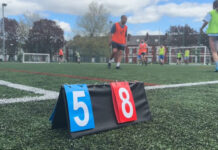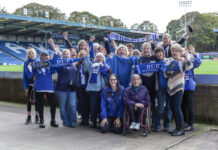On the 21st August 2016, Anyika Onuora was part of Team GB’s 4x400m relay team, which won bronze in the 2016 Rio Olympics. 10 months before that, her life nearly came to a premature end. This is a look at one of Merseyside’s most remarkable unsung sporting heroes.
On the 28th October 1984, Anyika was born to Nigerian parents, and lived in Liverpool with her mum, dad, and brothers Iffy and Emy. If you think those names ring a bell, it’s because they probably do. Her eldest brother Iffy made over 400 appearances in the English football league between 1989 and 2004. Emy is an academic famed for his book, “Pitch Black”, about the experiences of black British footballers.
Coming from a sporting family, Anyika played netball at her school (Archbishop Blanch Secondary) and excelled in athletics. So much so, her PE teachers encouraged her to get down to Liverpool Harriers athletics club.
Initially her parents were reluctant, and encouraged her to focus on her studies. But aged 15, she won the English Schools championships, and realised just how good she was.
Her first major competition was the 2003 European Athletics Junior Championships, where she finished fifth in her individual event of the 100m. She also won a silver medal as part of Great Britain’s 4x100m relay team.
In 2006, aged 22, she was selected to participate in her first major senior tournament, the Melbourne Commonwealth Games. Again in the relay team, she picked up another silver.
Her first flirt with the Olympics were with the 2008 Beijing games where she was selected as a back-up runner for Team GB. Ultimately wasn’t called upon to compete.
Her journey to eventual Olympic glory hasn’t always been a smooth one though. In 2010 her career threatened to de-rail.
Her national lottery funding was withdrawn and she lost her father in 2012 shortly before the London Olympics. For a lot of British athlete’s, London 2012 was the pinnacle of their careers – for Anyika it was quite the opposite. She underperformed. Understandable given the circumstances…
Instead of feeling sorry for herself, Anyika decided to use the adversity she faced to fuel her journey to Rio De Janeiro.
But just as things started to go her way, something awful happened.
Onuora is proud of her Nigerian roots, and often visited the village of her father’s birth, Nri. But after a visit in October 2015, while on holiday with her boyfriend in the Dominican Republic, Anyika didn’t feel quite right. What started as a dizzy spell, turn into a fever and discolouration of her urine. Something was badly wrong.
She emailed the doctor responsible for British Athletic athletes, and met with him when she returned home. She tried to continue training, but her body was fatigued and her symptoms were getting worse.
After some blood and urine analysis, she was told she needed to seek a Kidney specialist urgently. With no one to help her, she drove herself from Loughborough to London. Growing weaker and weaker as she drove, Anyika collapsed as she exited the car.
She was admitted right away, and seen to by experts who attempted to control her fever. Her temperature was close to forty degrees, and bags of ice were used to cover her bed, to try and help her return to a normal temperature.
Anyika received an MRI I scan, had several injections and was on a drip. The issue was her kidneys, but more specifically, malaria.
The Olympians struggled to believe the diagnosis. She knew there was a risk of malaria in Nigeria, and had been taking preventative tablets. But somehow, she had caught the deadly disease.
As you are probably aware, Malaria is not common in London. Medicine had to be delivered from a different hospital, before she was moved to the tropical disease’s unit. The pain was excruciating. She couldn’t walk, eat, move or sleep. The athlete remained in quarantine for a week.
She didn’t let anyone outside her immediate family know of her ill health. Onuora told her training team in Loughborough she was leaving them and going to train back on Merseyside. However, instead of Olympic level sprinting training, Anyika spent the upcoming weeks and months learning how to walk again, when she was finally well enough to leave bed.
The Liverpool born runner was lucky to be alive, and even luckier not to require dialysis for the rest of her life. And yet, less than a year later, Onuora was on an Olympic podium having won a bronze medal for Great Britain. At the third time of asking, Anyika was an Olympic medallist.
Now, three years on, Onuora is in training for Tokyo 2020 – potentially her 4th Olympic Games. She also speaks out about the rights and mental health of young women having had issues with body image in her younger life. Moreover she is an ambassador for the charity, Malaria No More.
A truly remarkable story, of a truly remarkable athlete.
(Pic by Jim Thurston)

















